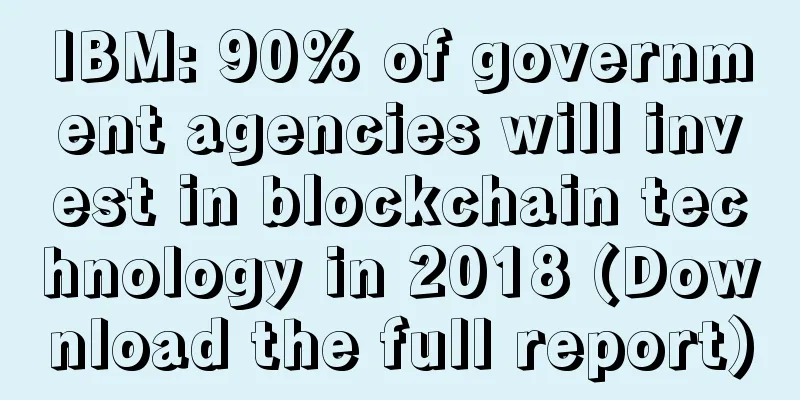IBM: 90% of government agencies will invest in blockchain technology in 2018 (Download the full report)

|
IBM's Business Value Institute released a blockchain research report titled "Building Trust in Government" (full report download), which stated that the vast majority of government personnel will pursue blockchain development in 2017. The survey covered 200 government leaders from 16 countries, and the report stated that by 2018, 90% of government organizations plan to invest in blockchain technology. Specifically, government agencies will actively investigate the applicability of blockchain technology in various fields, such as financial transaction management, asset management, contract management and regulatory compliance, with a focus on the immutability and transparency of blockchain technology. 90% of government leaders believe blockchain will have the greatest impact on regulatory compliance because the current systems and infrastructure used to enforce regulatory compliance are inefficient in terms of time, cost, and labor. Replacing regulatory and government IT systems is becoming a priority for U.S. government agencies as well as government leaders around the world. By 2018, governments hope to leverage autonomous, efficient blockchain platforms to cut regulatory costs. The IBM research report states:
One of the issues that government agencies are struggling with is the facilitation of information between multiple agencies due to inefficient data processing systems and servers. Most government agencies have connections with private organizations or businesses, and a lot of data flows between them. In this process, many institutions send and receive information, update data in real time and use a single centralized database or server to oversee all these operations. Data sets are often mistakenly deleted or misplaced from the database. In many cases, information is often lost in this process because the data lacks timestamps or special encryption keys. Once data is misplaced or deleted, it is difficult for government agencies to recover it because of the huge amount of information in their databases. Therefore, government officials believe that the implementation of blockchain technology, smart contracts and timestamps can significantly reduce the risks and costs in the process of maintaining shared databases. The IBM report states:
Currently, the U.S. government’s blockchain technology focuses on four key areas: citizen services, regulatory compliance, identity management, and contract management, all of which require immutability and transparency. This means that the U.S. government must deeply examine the development of decentralized blockchain technology, prioritizing security and immutability. Centralized blockchains or permissioned ledgers will only replicate existing government database structures without bringing substantial changes. If the U.S. government wants to see actual development and implementation of blockchain systems, it will need to follow a path similar to the one taken by the UK’s Financial Conduct Authority (FCA), which provides local startups with the ability to test their technology at a commercial scale. As previously reported by 8btc, the FCA authorized and approved London blockchain startup Tramonex, essentially allowing the company to issue electronic currency. Government officials must work with startups and developers to overcome certain barriers, such as security, transparency, and immutability, to ensure a more open and efficient blockchain-driven government. |
Recommend
Monero has successfully completed the hard fork upgrade at 20:32
Monero has mined the hard fork designated block h...
A picture of a mole on a man's right arm
How to interpret the mole on a man’s right arm? I...
[Market Analysis] Big data shows the trend of currency prices: Bitcoin pulls back, Litecoin rises slightly
1. Market trends The current price of Bitcoin is ...
About to bottom out? Google Bitcoin trend has dropped to the low point during the epidemic in March
Although Bitcoin has been hovering in the $10,000...
How to explain that a woman with a crooked mouth is unlucky
Everyone has their own characteristics, which are...
Are women with round faces good luck for their husbands? What does a woman with a round face look like?
As one of the traditional physiognomy techniques, ...
What does a mole next to the mouth mean?
Everyone has their own characteristics. Some peop...
Coinbase CEO: Almost every sector of the economy is struggling, and Bitcoin is exactly what people need at this moment
Editor's note: This article has been edited w...
Modern White Bone Spirit
The term "strong woman" has become popu...
Bloomberg Report: Bitcoin to Surpass All Other Currencies in 2016
According to Bloomberg, Bitcoin saw the largest i...
Central banks find it hard to ignore blockchain technology, which has great potential for development
Central banks are increasingly showing interest i...
What are the characteristics of a person with a rough fate? Which types of people have the worst fate?
People will experience many things in their lives...
How to resolve a mole on the forehead? These methods are the first choice
The "Jianmen" is actually what we call ...
Is it good for people to have a mole on the left side of their chin?
In physiognomy, people with a mole on the left si...
Cryptocurrency mining "Battle Royale", grassroots "miners" at the end of the year
Image source: Visual China "I have lost a to...









